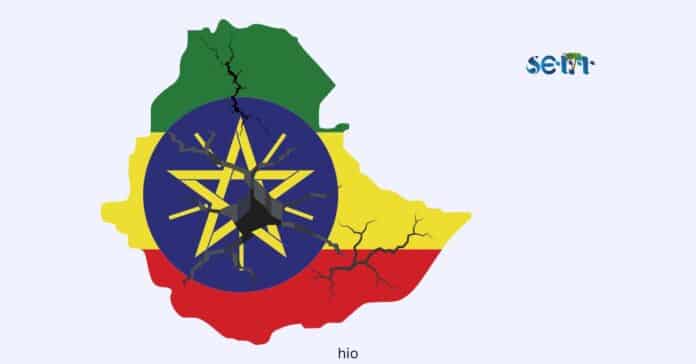The recent statements by Ethiopian Prime Minister Abiy Ahmed delivered during a parliamentary session in response to questions from members of parliament—have raised alarm across the Horn of Africa. His remarks questioning Eritrea’s independence and hinting at a supposed Ethiopian “right” to the Red Sea, even by force, mark a perilous escalation in rhetoric.
Yet behind these fiery words lies a deeper story: one of domestic decay, political desperation, and the revival of Ethiopia’s old imperial illusions.
A Desperate Leader Confronting Internal Collapse
Abiy’s latest outburst cannot be understood apart from Ethiopia’s worsening internal crisis. The country is engulfed in growing fragmentation, particularly in the Amhara and Oromia regions, which together represent roughly 60 per cent of Ethiopia’s population and economic base. Both regions are now in open rebellion against the federal government, and Abiy’s control is visibly weakening.
Confronted with multiple insurgencies, economic decline, and public disillusionment, the prime minister appears to be seeking an external scapegoat. By blaming Eritrea for Ethiopia’s failures, he aims to redirect popular anger outward and to rally nationalist sentiment behind a manufactured grievance.
This is an old playbook: when the domestic order falters, find a foreign enemy.
Contradictions and Historical Revisionism
Abiy’s parliamentary remarks were riddled with contradictions. On one hand, he questioned the legitimacy of Eritrea’s independence, claiming that the transitional Ethiopian government of the early 1990s lacked authority to approve it. This argument is both historically false and legally irrelevant.
Eritrea was never part of Ethiopia in a manner that required “approval” for separation. Its federation with Ethiopia was unilaterally dissolved by Emperor Haile Selassie in violation of United Nations resolutions. Eritrea’s independence was not granted by Ethiopia—it was won through a thirty-year war of liberation, and internationally endorsed through the UN-supervised 1993 referendum, in which 99.8 per cent of Eritreans voted for independence.
Ironically, Abiy himself signed the 2018 Peace Agreement with Eritrea, formally recognising its sovereignty and borders—including the port of Assab, which he now claims Ethiopia “lost unfairly”. This contradiction exposes the political opportunism driving his narrative.
Empty Threats and Military Reality
Abiy’s reckless suggestion that Eritrea could meet the fate of “Ukraine or Gaza” reveals more about his desperation than his strength.
In reality, the Ethiopian army is overstretched and demoralised, struggling to contain domestic rebellions in Amhara and Oromia. The idea that such a government could launch an external war is detached from reality. These are not the words of a confident leader—they are threats born of frustration and insecurity.
The Myth of Negotiating Sovereignty
The prime minister accused Eritrea of refusing to “negotiate” over Assab. But negotiate what, exactly? No sovereign state on earth negotiates its own territorial integrity. What Abiy proposes is not dialogue it is concession under duress.
Eritrea has consistently affirmed its readiness to cooperate on trade and port access within lawful, mutually beneficial frameworks. What it will not do is bargain away its sovereignty. Access to the sea can be achieved through respect and commerce, not revisionism and threats.
The Illusion of Mediation
Equally puzzling are Abiy’s claims that he has sought mediation from the United States, Russia, China, and African states over sea access. Port services are commercial matters, resolved through agreements, not mediation.
By invoking global powers, Abiy betrays his real motive: a quest for political endorsement of territorial ambition. No responsible state will mediate an agenda that directly undermines another nation’s sovereignty. The idea is diplomatically absurd.
Misplaced Analogies with Ukraine
Abiy’s comparison of Ethiopia’s situation to that of Ukraine reveals either deep misunderstanding or deliberate manipulation. The Ukraine conflict is primarily a confrontation between global powers, with Ukraine serving as a proxy battlefield. Eritrea, by contrast, is a small but sovereign nation defending its independence from a neighbour in turmoil.
There is no meaningful parallel. Abiy’s analogy only highlights the intellectual confusion and moral incoherence at the heart of his argument.
Eritrea’s Strategic Restraint
Eritrea’s response to Abiy’s provocations has been calm and measured. Its diplomacy is guided by two principles:
- Avoiding rhetorical escalation that could inflame the region.
- Strengthening regional partnerships to deter reckless adventurism.
Asmara understands that loud diplomacy serves only those seeking distraction. Eritrea has therefore chosen the path of quiet strength—asserting its sovereignty without feeding the theatrics of a faltering regime.
The Question of Recognition
Perhaps the most bizarre of Abiy’s claims is that Ethiopia lacks official documents recognising Eritrea’s independence. This is demonstrably false.
The Addis Ababa Conference of 1991, which led to the establisment of Ethiopia’s transitional government following the fall of the Derg regime, explicitly accepted Eritrea’s right to self-determination. The UN mission that supervised the 1993 referendum worked in full cooperation with Ethiopian authorities.
Furthermore, Abiy personally signed the 2018 Eritrea–Ethiopia Peace Agreement, which reaffirmed the final and binding border ruling. Recognition of that border is recognition of Eritrea’s sovereignty. To now deny this is to repudiate Ethiopia’s own international commitments.
Expansionism Disguised as Desperation
Abiy Ahmed’s rhetoric signals a dangerous return to the expansionist fantasies that once fuelled decades of conflict in the Horn of Africa. His attempt to rewrite history and question Eritrea’s independence is not a display of vision but of vulnerability.
This is not the voice of a confident leader—it is the cry of one cornered by failure. Yet the danger lies in how such rhetoric, once unleashed, can reshape public sentiment and destabilise an entire region.
The international community must therefore recognise these threats for what they are: a diversion from internal collapse, and a revival of Ethiopia’s most destructive impulses.
The Horn of Africa has paid dearly for imperial delusions in the past. It cannot afford a repeat.

